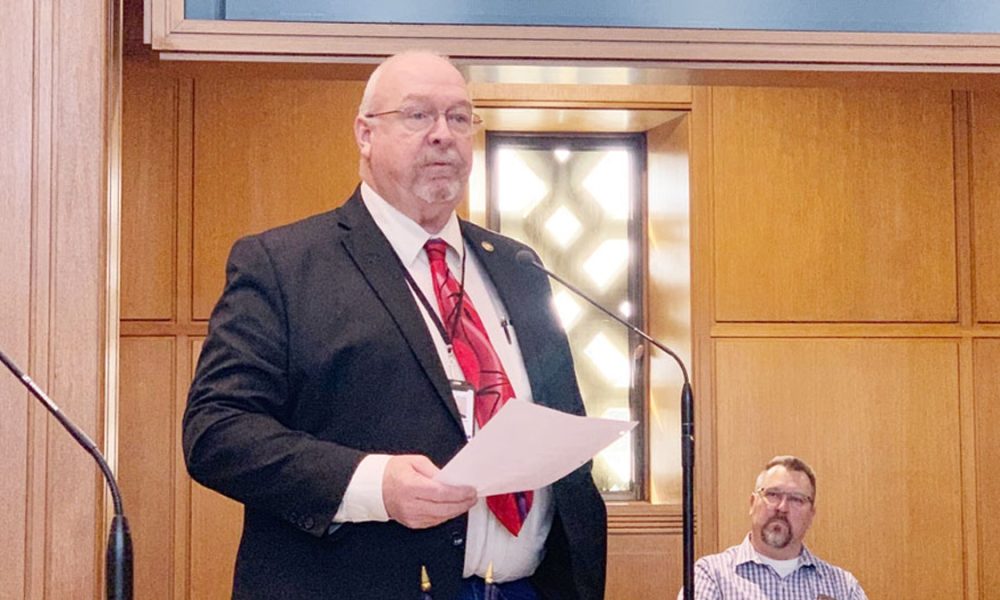 State Rep. Lynn Findley speaking at the legislature. (The Enterprise/File)
State Rep. Lynn Findley speaking at the legislature. (The Enterprise/File)
VALE — After an eventful legislative session, state Rep. Lynn Findley is spending time at home before hitting the road to check in with his district.
“It’s tough,” Findley said about maintaining a relationship with Eastern Oregon communities while spending half the year in Salem. That’s why Findley, a Republican from Vale, hopes to visit each of the five counties in his district once or twice a month during the interim to hold coffee hours and informal talks about what is pressing the people he represents.
From demonstrations against HB 2020, the cap and trade bill, to a race against the clock on the final day of the session, the past six months highlighted the divide between the Republicans and Democrats in the capital, which frustrated Findley.
“On the outside it was very partisan. I found that very disappointing,” Findley said. But the freshman legislator said that effective lawmaking all comes down to respecting each other’s opinions and varying perspectives.
“We all were sworn in with the same oath,” he said.
Findley spent 32 years working for the Bureau of Land Management before retiring in 2003.
In 2013, Findley came out of retirement to serve as the city manager of Vale until January 2018 when he became a state representative.
Though this was his first full session, Findley said that he was more like a “redshirt freshman” due to his experience in the short 2018 session.
Having spent his entire career working in government, Findley said that he didn’t take away new lessons from this session, but rather new relationships within the capital. Looking back over the past six months, Findley said two of his bills stand out: HB 2449 and HB 2456.
Findley considers HB 2449, a bill that increased taxes to raise money for improving emergency dispatch services, to have the greatest impact of the bills he sponsored.
The tax, which hadn’t been raised since 1995, didn’t pass without a struggle.
The bill was dropped on the first day of the session and passed on the very last, facing pushback from telecommunications and internet providers who market their services with a flat fee and representatives who wanted to see improvement in dispatch efficiency before increasing funds.
“I don’t like to raise taxes,” Findley said, but he felt the lack of funding for many dispatchers meant they were already operating on shoestring budgets.
Now that the bill has passed, Findley plans on working with dispatch centers to increase efficiency so the new funds have the most impact.
The biggest disappointment of the session was the failure of HB 2456, a bill Findley wrote to rezone non-viable farmland for residential use.
Findley said that when zoning areas were created in the 1970s, a large swatch of land was circled with “big, white magic marker” and labelled as farmland.
In reality, there are parts of that land that are not high-value farmland due to the soil, Findley said.
The bill, written on behalf of the Eastern Oregon Border Economic Development Board to promote area growth, was opposed by the Oregon Farm Bureau and 1000 Friends of Oregon because it rezoned farmland.
“The opposition to that was meritless in my opinion. I wouldn’t want to take one acre out of farm ground,” Findley, a fourth-generation farmer, said. “This bill wouldn’t have done that.”
HB 2456 made it through the House, but didn’t have enough votes in the Senate. A session recap on the 1000 Friends of Oregon website labels the “killed” bill as a legislative win.
Findley is tasked with representing rural Oregon in Salem, and while he could blame the rural-urban divide for partisan issues, he chooses to talk about perspective instead.
“If you’re from Portland, you think that Willsonville is rural,” Findley said. Instead of lamenting the historic divide, he provides the perspective of rural life.
For example, Findley said that HB 2020 discouraged driving and promoted the use of mass transit. That works for Portlanders who have access to TriMet buses and MAX streetcars, but not for people in Malheur County who may have to travel 100 miles to see a doctor.
While Findley believes Oregon must adapt and react to the changing climate, he doesn’t want places like Malheur County to get harmed in the process.
“We can’t kill our economy,” Findley said.
Have a news tip? Reporter Isabella Garcia: [email protected] or 541-473-3377.
For the latest news, follow the Enterprise on Facebook and Twitter.
SUBSCRIBE TO HELP PRODUCE VITAL REPORTING — For $5 a month, you get breaking news alerts, emailed newsletters and around-the-clock access to our stories. We depend on subscribers to pay for in-depth, accurate news produced by a professional and highly trained staff. Help us grow and get better with your subscription. Sign up HERE.




